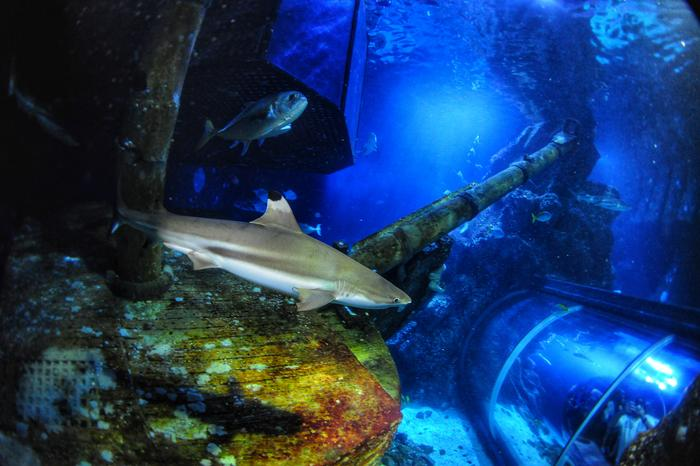As the oceans become more acidic, shark teeth are likely to become weaker and more brittle, according to the findings of a new study. The idea of some of the world’s most formidable predators becoming less lethal might comfort surfers, but this will also undermine ocean ecosystems. Moreover, sharks’ teeth are just one of many points of vulnerability we have not previously considered.
Sharks’ capacity to grow new teeth and drop their old ones is a key reason some of them live so long as individuals, and they have collectively proven such survivors. It’s a feature that has extended to some of the largest apex predators the world has ever known, which produced some suitably enormous teeth.
Despite all the changes sharks have seen in their long years, there is one thing their teeth are not prepared for, the new research indicates: human-generated greenhouse gas emissions.
When carbon dioxide is dissolved in water, it makes it acidic. Enough of the carbon dioxide released by burning fossil fuels is absorbed by the oceans to move the slightly alkaline conditions towards neutral, a process known as ocean acidification.
The effects of ocean acidification on coral reefs have been widely studied for decades, and the fate of other shell-forming invertebrates has been investigated as well. Teeth, however, have attracted less attention, but that appears to be a dangerous oversight.
“Shark teeth, despite being composed of highly mineralized phosphates, are still vulnerable to corrosion under future ocean acidification scenarios,” said first author Maximilian Baum of Heinrich Heine University Düsseldorf (HHU) in a statement. “They are high developed weapons built for cutting flesh, not resisting ocean acid. Our results show just how vulnerable even nature’s sharpest weapons can be.”
Baum and co-authors collected 600 teeth left behind by blacktip reef sharks in an aquarium. The teeth were placed in tanks for eight weeks with contrasting levels of acidity, with those in the best condition studied with a scanning electron microscope.
“We observed visible surface damage such as cracks and holes, increased root corrosion, and structural degradation,” on those held in more acidic water, said senior author Professor Sebastian Fraune. The authors think these teeth are also more likely to break under pressure, or be worn down more quickly than they can be replaced.

Blacktip reef sharks at Sealife Oberhausen supplied the teeth for the study on their vulnerability to a changing ocean.
Image credit: Max Baum
The authors acknowledge this is not the end of the story, since living teeth have repair processes that dropped ones do not. “In living sharks, the situation may be more complex. They could potentially remineralize or replace damaged teeth faster, but the energy costs of this would be probably higher in acidified waters,” Fraune explained. In other words, even if sharks can adapt, the price of doing so will probably be paid in other ways.
It’s much harder to acidify a 1,500,000-liter tank like the one these sharks live in than 20-liter ones used to process the teeth. Animal ethics committees would also need to give approval. Nevertheless, there may be no other way to know what sort of world we are creating for the creatures we share it with.
It’s also uncertain how widely the effects will spread. Blacktip reef sharks swim with their mouths open to maximize their access to dissolved oxygen. This may make for greater exposure to acidic ions than fish that keep their mouths closed. However, it’s the fish that can’t replace their teeth as frequently that may be most affected.
Comfortingly, the more acidic tank used in the experiment had an average pH of 7.37, a level the oceans are not anticipated to reach until 2300, and then only if emissions are sustained.
Nevertheless, if even a few keystone species are affected under more moderate conditions, the consequences could ripple through the ocean ecosystem.
“Maintaining ocean pH near the current average of 8.1 could be critical for the physical integrity of predators’ tools,” Baum said. Otherwise, we may face a whole new meaning for gummy shark.
Carbon dioxide levels have varied a lot over the 450 million years since sharks evolved, but have not been as high as they are today for at least the last 20 million years. The levels tested in this case resemble a peak some 200 million years ago, but when that occurred, sharks and all other animals had plenty of time to evolve responses. Two hundred years is unlikely to be enough.
“This study began as a bachelor’s project and grew into a peer-reviewed publication. It’s a great example of the potential of student research,” said Fraune. “Curiosity and initiative can spark real scientific discovery.”
The study is published in Frontiers in Marine Science.
Source Link: Shark Teeth Are Losing Their Bite As Ocean Acidification Takes Hold